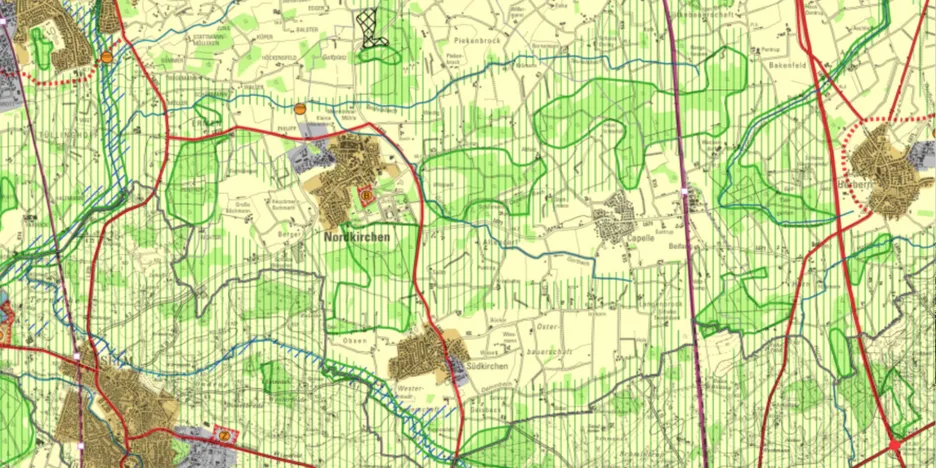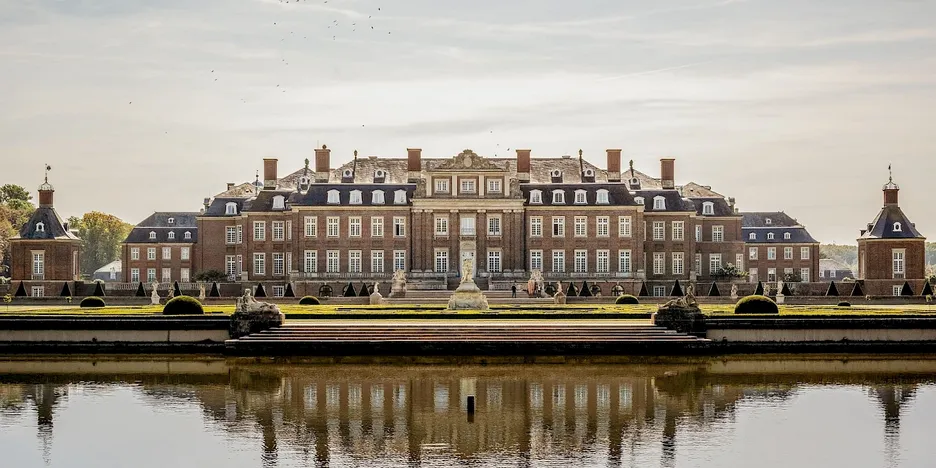A REGION BETWEEN BAROQUE, CULTURAL LANDSCAPE AND CLIMATE CHANGE
THEME . This semester we are working in Münsterland. The landscape is characterized by an almost park-like cultural landscape as well as palaces and castles. Nordkirchen Castle has even been called the 'Westphalian Versailles' ... but can this historical idyll survive in the face of today's challenges, the demand for residential and commercial space, raw material extraction and now also energy production? Or can the established cultural landscape provide the structures to shape a landscape-friendly transformation? Citizens from Nordkirchen approached us with this question.
As required by law for all regions, the spatial future of the Münsterland is to be organized by the regional plan. Regional plans and the landscape framework plans contained therein are upstream of the urban land-use planning and green planning of the municipalities and are intended to promote balanced development, equivalence, but also diversity of the 'sub-regions' of Germany.
However, the picture of the future it contains can at best only be read by experts - the categories, plan symbols and hatchings that a formal regional plan is allowed to display appear extremely abstract and not very clear.
In the project, we want to achieve two things: translate the regional plan into generally understandable, interesting spatial images and thus bring together new structural development and the established cultural landscape.
BACHELOR . The focus of the project work is on the Münsterland landscape area that stretches between Nordkirchen, Südkirchen and Capelle. The aim is to develop a regional structural concept as an informal spatial image for the Regionalpan, to integrate existing landscape qualities and to improve the ecological, social and aesthetic conditions.
MASTER . The working area for the Masters is the entire Münsterland regional plan. Local settlement and landscape structures are to be developed in a differentiated typology. The legal basis of the regional plan, the Raumordnungsgesetz (ROG), the Landesplanungsgesetz and the Landesentwicklungsplan (LEP) will be examined in depth.
BACHELORTHESIS . The focus of a thesis on Nordkirchen and / or the Münsterland could be on the cultural landscape as a place of social encounter and a collective work; or on landscape structure dimensions, spatial proportions and textures; or on a collage landscape for the design of suburban functional zones ...

DATES . supervision and presentation days every Monday from 13:15 . Location Studio O5
We 23.04.2025 _ from 16.00 _ short project presentation at the start of the semester
Mo 28.04.2025 _ project kick-off - introduction & first tasks
Mo 05.05.2025 _ supervision - analysis & independent excursion planning
CW19 _ project excursion
Mo 12.05.2025 _ supervision - analysis
Mo 19.05.2025 _ supervision - analysis
Mo 26.05.2025 _ presentation - analysis
Mo 02.06.2025 _ supervision - concept
Do 12.06.2025 _ optional supervision - concept
Mo 16.06.2025 _ presentation concept
Mo 23.06.2025 _ supervision - design
Mo 30.06.2025 _ supervision - design
Mo 07.07.2025 _ supervision - design
Mo 14.07.2025 _ supervision - design
Mo 21.07.2025 _ final presentation
REGISTRATION . no later than 23.4.2025 binding registration via TUMonline . Bachelor's thesis registration via course AR71154 Forschungsdesigns Regionale Freiräume
SUPERVISION . Prof. Dr. Sören Schöbel, M.A. Paula Erber, M.A. Sabine Kern
Open to students from the degree programs
BACHELOR Landscape Architecture (L6) - Project 4 Region . 9 ECTS
MASTER Landscape Architecture oder Urbanism (M1/M2) . 15 ECTS
BACHELORTHESIS Landscape Architecture 15 ECTS . can be combined with Forschungsdesign Regionale Freiräume 6 ECTS
